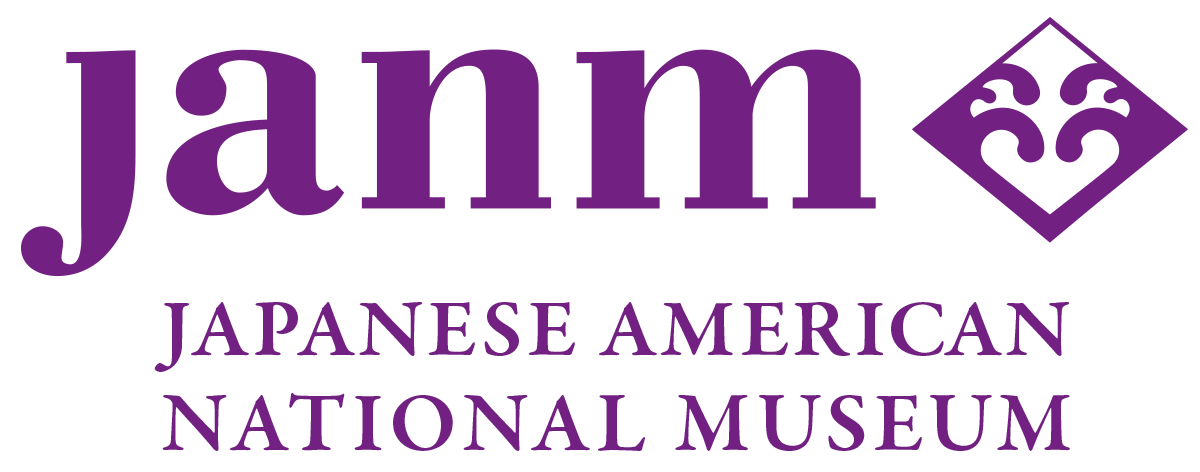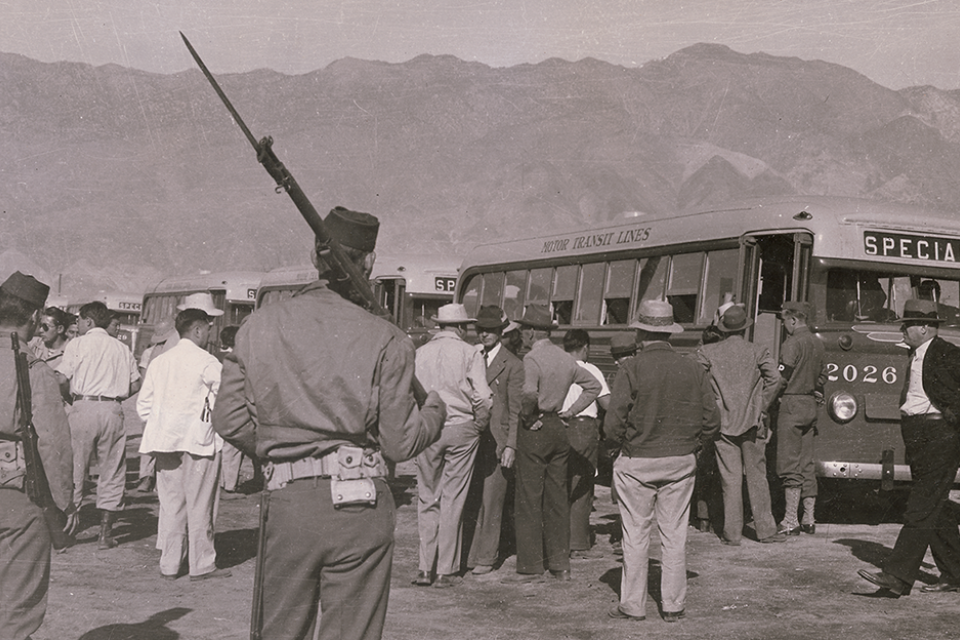即日発表 - 2017年01月26日
プレス連絡先:
Leslie Unger, JANM - lunger@janm.org - 213-830-5690
Karen Denne, The Broad Foundation - kdenne@broadfoundation.org - 310-954-5058

NEW JANM EXHIBITION TO FEATURE ORIGINAL EXECUTIVE ORDER AUTHORIZING WWII INCARCERATION OF JAPANESE AMERICANS, ON LOAN FROM THE NATIONAL ARCHIVES
Executive Order 9066 plus Presidential Proclamation 2537 to be displayed
From February 18 to August 13, 2017, the Japanese American National Museum will present Instructions to All Persons: Reflections on Executive Order 9066, a new exhibition that commemorates the 75th anniversary of President Franklin Roosevelt’s signing of Executive Order 9066, which led to the tragic and unlawful incarceration of 120,000 individuals of Japanese ancestry during World War II. For the first three months of the exhibition, original documents from the National Archives never before displayed in the Western United States will be the centerpiece of the exhibition. Instructions to All Persons is funded by The Eli and Edythe Broad Foundation.
President Roosevelt signed Executive Order 9066 on February 19, 1942, just a little more than two months after the bombing of Pearl Harbor. Shortly after, a series of Civilian Exclusion Orders were publicly posted all along the West Coast of the United States, notifying persons of Japanese ancestry of their impending forced removal. “Instructions to All Persons of Japanese Ancestry” were the infamous words seen at the top of the posters. Historic examples of these documents and others of the period, along with documentary videos, will form the substance of the exhibition. Contemporary artworks by Wendy Maruyama and Mike Saijo will be featured as well.
Through May 21, the original Executive Order 9066, including the page bearing Roosevelt’s signature, will be on loan from the National Archives. In addition, Presidential Proclamation 2537, a key precursor to Executive Order 9066 that required individuals from the enemy countries of Germany, Italy, and Japan to register with the United States Department of Justice, will be displayed, also on loan from the National Archives. After May 21, replicas will be on display for the duration of the exhibition. Executive Order 9066 was most recently displayed in Washington, DC, in 2013; prior to that it was on view at the Smithsonian’s National Museum of American History in 1987 and 1988.
Instructions to All Persons is intended to engage visitors in critical discussions of the Japanese American incarceration experience and its continuing relevance today. It aims to examine the social impact of language and encourage viewers to contemplate the lessons of the past, as well as to compare World War II experiences with current events.
“Instructions to All Persons is an important exhibition that looks back at pivotal actions by the American government that led to tragic outcomes for Japanese Americans during World War II, while at the same time demonstrating how the lessons of that shameful chapter of history are powerfully meaningful in our world today and how without vigilance that grave injustice could happen again,” said Ann Burroughs, Interim President and CEO of the Japanese American National Museum. “This is an exhibition that everyone who cares about civil rights, democracy, and justice needs to see.”
“This historic anniversary is an opportunity to remember the unconscionable indignity our country imposed on Americans because of the color of their skin and their ancestry, and it is an important reminder to all of us that we must never repeat these injustices,” said Eli Broad, founder of The Eli and Edythe Broad Foundation. “These original documents are critical to share with a generation that has only learned of the Japanese American incarceration through history books. We are pleased to support this exhibition and hope this is the catalyst for an important dialogue, especially with young people, about human rights and dignity.”
“We are pleased to partner with the Japanese American National Museum to bring these historic documents to Los Angeles, where their history and social impact was so deeply experienced, and to this museum, on the very spot where Japanese Americans’ belongings were stored when they were interned,” said Archivist of the United States David S. Ferriero. “These are two of the hundreds of thousands of documents held by the National Archives relating to Japanese American internment—from the original Executive Order 9066, to camp photos by Dorothea Lange, to records of interned individuals and families, to the 1988 Civil Liberties Act, in which the government admitted a wrong, and acted to compensate those who suffered from this unjust order.”
In addition to the two- and three-dimensional artifacts and artworks, the museum has partnered with East West Players, the nation’s premier Asian American theatre, for a limited number of special performances that will take place in the Instructions galleries. Each performance will be made up of three vignettes that use Japanese American, Muslim American, and Native American stories to explore civil rights and threats to those rights. Performances are slated for March 4, April 1, and April 8, all at 12:30 p.m. Performances are included with museum admission. No RSVP is necessary. Space is limited and will be available on a first come, first served basis.
Beginning March 24, the museum will additionally offer Moving Day, a public art piece in which reproductions of approximately 80 exclusion orders will be projected on the exterior of JANM’s historic building located at 369 E. 1st Street, from sundown to midnight. Projections will coincide with the date of the orders’ issuance. The historic building, located across the plaza from JANM’s current Pavilion building, was itself a designated reporting location for Japanese Americans in 1942; many were able to store their belongings in the building during their incarceration. Little Tokyo Service Center is a community partner and supporter of Moving Day.
For more information about Instructions to All Persons: Reflections on Executive Order 9066, visit janm.org/instructions-to-all.
NOW ON VIEW AT JANM:
Special Display—Only the Oaks Remain: The Story of Tuna Canyon Detention Station
Through April 9, 2017
This special display tells the true stories of those targeted as dangerous enemy aliens and imprisoned in the Tuna Canyon Detention Station, located in the Tujunga neighborhood of Los Angeles, by the US Department of Justice during World War II. Photographs, letters, and diaries bring the experiences of imprisoned Japanese, German, and Italian immigrants and Japanese Peruvians to life. This project was organized by the Tuna Canyon Detention Station Coalition; funded, in part, by a grant from the US Department of the Interior, National Park Service, Japanese American Confinement Sites Grant Program; and sponsored by the San Fernando Valley Japanese American Community Center.
Common Ground: The Heart of Community
Ongoing
Incorporating hundreds of objects, documents, and photographs collected by JANM, this exhibition chronicles 130 years of Japanese American history, from the early days of the Issei pioneers through the World War II incarceration to the present.
About the Japanese American National Museum (JANM)
Established in 1985, the Japanese American National Museum promotes understanding and appreciation of America’s ethnic and cultural diversity by sharing the Japanese American experience. Located in the historic Little Tokyo district of downtown Los Angeles, JANM is a hybrid institution that straddles traditional museum categories and strives to provide a voice for Japanese Americans as well as a forum that enables all people to explore their own heritage and culture. Since opening to the public, JANM has presented over 70 exhibitions onsite and traveled 17 of its exhibitions to locations around the world, including the Smithsonian Institution and the Ellis Island Museum in the United States, and several leading cultural museums in Japan and South America.
JANM is located at 100 N. Central Ave., Los Angeles. Museum hours are Tuesday, Wednesday, Friday, Saturday, and Sunday from 11 a.m. to 5 p.m. and Thursday from noon to 8 p.m. General admission is $10 adults, $6 students and seniors, free for members and children under age five. Admission is free to everyone on Thursdays from 5 p.m. to 8 p.m. and every third Thursday of the month from noon to 8 p.m. General admission prices and free admission times may not apply to specially ticketed exhibitions. Closed Monday, 4th of July, Thanksgiving, Christmas, and New Year’s Day. For more information visit janm.org or call 213.625.0414.
About The Broad Foundation
The Broad Foundations, which include The Eli and Edythe Broad Foundation and The Broad Art Foundation, were established to advance entrepreneurship for the public good in education, science and the arts. For more information, visit www.broadfoundation.org.
About the National Archives
The National Archives is an independent Federal agency that serves American democracy by safeguarding and preserving the records of our Government, so people can discover, use, and learn from this documentary heritage. The National Archives ensures continuing access to the essential documentation of the rights of American citizens and the actions of their government. From the Declaration of Independence to accounts of ordinary Americans, the holdings of the National Archives directly touch the lives of millions of people. The agency supports democracy, promotes civic education, and facilitates historical understanding of our national experience. The National Archives carries out its mission through a nationwide network of archives, records centers, and Presidential Libraries, and online at www.archives.gov.

